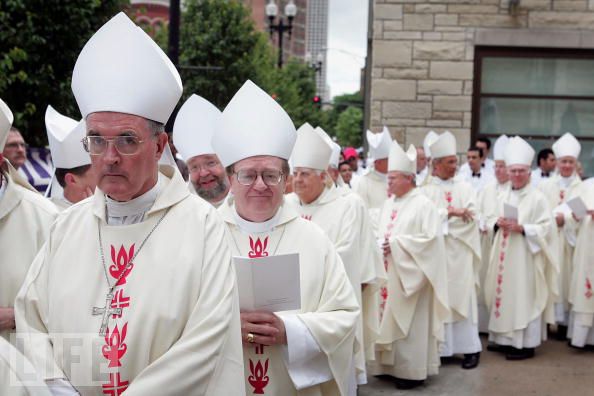In 1993, as the new Clinton Administration was taking office and broadcasting its determination to advance comprehensive healthcare reform, the US Catholic bishops issued a public resolution entitled, "A Framework for Comprehensive Health Care Reform: Protecting Human Life, Promoting Human Dignity, Pursuing the Common Good." It was written by the bishops' Domestic Social Policy Committee in the early months of the new administration, and stated unequivocally the Catholic commitment to providing universal healthcare.
The bishops wrote, "For decades, we have advocated sweeping reform. In communities across our land, we serve the sick and pick up the pieces of a failing system. We are pastors, teachers, and leaders of a community deeply committed to comprehensive health reform. Our urgency for reform reflects both on our traditional principles and everyday experience."
![]()
On Monday, President Obama issued his own plan for accomplishing what had previously eluded the Federal Government for 17 years. Since the end of the Clinton years, the rate of increase in healthcare costs has grown 15% faster than gross domestic product, and these costs have proven to be an immense burden on the US economy. But from a Catholic perspective, it is the escalating human cost that is so compelling: 25% more people with no health insurance over the past 8 years, continued increases in bankruptcy because of a personal health crisis (half of all family bankruptcies), and perpetuation of grave health disparities based on race and income level.
The Obama plan bridges the differences between the House and Senate versions of healthcare reform that passed with majority support last fall. In short, the President proposes offering more help to all the states for coverage of their poorest citizens through Medicaid in the early years of the program, particularly in the face of an economic crisis that has led to massive budget cuts by state governments across the country. The plan also plugs the "donut hole" in the medical budgets of elderly people that was left unfunded when the Part D Medicare drug benefit was enacted during the Bush Administration.
The plan would for the first time seek to prevent the kind of massive health insurance premium increases that have recently come to light in Michigan and California, focused on small business owners who would suffer devastating new levels of un-insurance due to lack of affordability without passage of the new reforms.
Perhaps most importantly, the plan would create conditions that provide coverage for 31 million additional people who currently depend on emergency rooms for their routine medical care, at great cost to local governments and all the other patients who actually have insurance coverage. The ten-year cost for this critical social priority, projected by the administration to be about $950 billion, is significantly less than the money that the US will have spent for the first ten years of war in Iraq, according to estimates published in 2008 by Professors Linda Bilmes and Joseph Stiglitz.
The president's plan draws on both the House and Senate versions in order to fund the legislation, combining a reduction in the Bush tax cuts for upper income Americans with a more slowly implemented tax on employer compensation represented by high end health insurance plans. In stark contrast to the Iraq War, which was funded outside the budget with emergency appropriations, the Obama healthcare plan would not add to the budget deficit.

Many Catholics and others have been concerned about the prospect of healthcare reform resulting in abortion services being funded with federal dollars. Despite news reports to the contrary, the 11-page outline of the Obama plan makes no reference to abortion funding. But in his speech to a joint session of Congress last September, President Obama laid those fears to rest when he said, "One more misunderstanding I want to clear up: under our plan, no federal dollars will be used to fund abortions, and federal conscience laws will remain in place."
Nearly half of all Americans currently live in the 17 states that pay for abortion services with state Medicaid dollars, health plans that are currently supported with federal funds--though such funds are rarely paid directly to abortion providers. Conservative opponents immediately lambasted the Obama plan because it did not explicitly adopt the language of the House Stupak Amendment. But at the center of the Stupak language was a prohibition against "the public option" offering any plans that cover abortion. The problem with the logic of these critics is that the Obama plan not only makes no reference to abortion, it makes no reference to a public option.
The key question on abortion, then, is whether some version of the Stupak language, even in the absence of a "public option," would be required to attract the votes of more conservative members of Congress. But theoretically, any prohibition on a contribution by the Federal Government to insurance policies that cover abortion would also affect Federal support for care of all poor people in the 17 states that subsidize abortion services. This would represent a clear break from the Catholic consensus early last year, articulated by the US bishops, that sought only to retain an abortion-neutral approach to funding in the context of the whole healthcare reform effort.
Conservative critics also continue to ignore the administration's encouragement of Democratic legislation that seeks to better support pregnant women and aims to significantly decrease the number of abortions in the United States. Particularly in light of January data from the Guttmacher Institute that both teen pregnancy and abortion began rising in 2006, late in the Bush Administration, the Obama initiatives to decrease abortion take on a new urgency that complements efforts to provide expanded healthcare for the millions of Americans currently without it.
Opponents of the efforts by President Obama, the Catholic bishops, and others to expand healthcare were quick to wave the flag of "a massive government takeover," in the words of House Minority Leader John Boehner. He implicitly denied an assertion on the White House website that "Throughout the debate on health insurance reform, Republican concepts and proposals have been included in legislation. In fact, hundreds of Republican amendments were adopted during the committee mark-up process. As a result, both the Senate and the House passed key Republican proposals that are incorporated into the President's Proposal."

Thursday, February 25, President Obama will convene a historic meeting of Republicans and Democrats to find common ground on the healthcare bills that have already passed Congress. He has responded to critics who said that there was too little transparency with regard to the details of the Democratic legislation by putting his proposed final bill on the White House website. Americans will have a chance to judge for themselves what is the best way forward in solving the complicated healthcare puzzle that currently neglects so many, and casts a shadow of anxiety for millions more.
In the end, the Obama plan represents a healing effort to bridge the differences in funding strategies and the extent of universality between the House and Senate versions of the health reform legislation. As the bishops asserted in their August 2009 Statement on Healthcare, "In our Catholic tradition, health care is a basic human right. Access to health care should not depend on where a person works, how much a family earns, or where a person lives. Instead, every person, created in the image and likeness of God, has a right to life and to those things necessary to sustain life, including affordable, quality health care." President Obama has put his own reputation on the line with a specific plan that could represent a giant step forward in fulfilling this critical Catholic imperative, in service to the common good.




